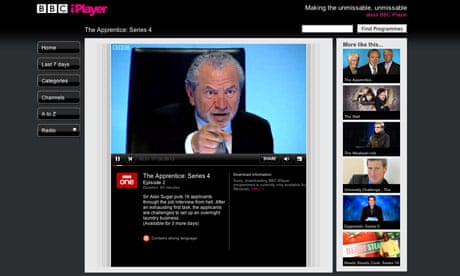The BBC should not be forced to help pay for the creation of next-generation superfast broadband networks the Ofcom chief executive, Ed Richards, told MPs today.
Internet service providers have seen traffic leap dramatically since the BBC iPlayer was launched, leading to problems with capacity.
Earlier this month Tiscali said the BBC should help pay to upgrade the UK's broadband networks.
In evidence to a joint session of the Commons Culture, Media & Sport and Business and Enterprise committees, Mr Richards said getting content providers such as the BBC to pay was one way network upgrades may happen.
However, he added: "[But] it is not necessarily the only way it can happen and it is not necessarily the way we would anticipate it will happen."
As demand for online video services increases more investment will be needed, he said. The money to pay for that investment is likely to come from a number of sources.
"I am not convinced myself that the right answer to that is to get the BBC to pay for the iPlayer," he said.
He said it was more sensible for the investment burden to be shouldered by network operators and consumers, with prices likely to rise for faster connections.
He said he would not rule out "content-led tariff models" – where ISPs do deals with content providers so their services run more smoothly over their networks.
Asked whether Ofcom has the power to levy the BBC for so-called next-generation access networks Richards said, "I am very sure we don't have that power ... and I'm pretty disinclined to go down that route".
Superfast
Ofcom has already held a public discussion about superfast broadband networks and is due to carry out further work this year.
Meanwhile the government has held a summit with industry figures to decide how to keep the UK at the forefront of broadband development and further meetings are planned.
Anthony Wright, Labour MP for Great Yarmouth, said public money may have to be used in order to get super-fast networks across the country.
But Ofcom's chairman, Lord Currie, disagreed: "Clearly that is an issue for government," he said.
"But I would have thought the cost here is very considerable and I would have thought it was probably an unnecessary use of public funds."
Ofcom believes the industry should be allowed to work out the extent of next-generation access networks, with government filling in where there is no economic case for superfast broadband.
Richards pointed out initial projections for traditional broadband access had suggested it would reach just 60% of the UK, whereas broadband was now available to over 99% of the population without any government intervention.
Ofcom bosses also came under fire from some MPs for conducting research into the use of social networking sites such as Facebook and MySpace.
In their defense Richards said in the past regulators had been criticised for failing to understand the habits of consumers in their markets.
"We have put a lot of money into research and in a sense we have done so unashamedly," he said.
"Social networks are one of the most explosive areas of growth," he added.
"We don't regulate content but we need to understand how content is changing in order to make intelligent judgements about things like public service broadcasting."
· To contact the MediaGuardian news desk email editor@mediatheguardian.com or phone 020 7239 9857. For all other inquiries please call the main Guardian switchboard on 020 7278 2332.
· If you are writing a comment for publication, please mark clearly "for publication".
